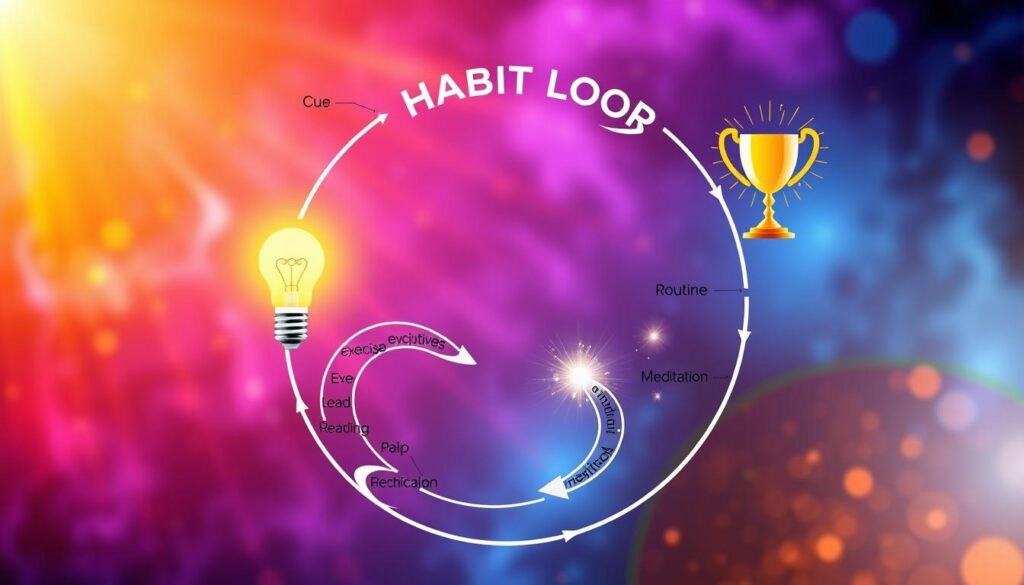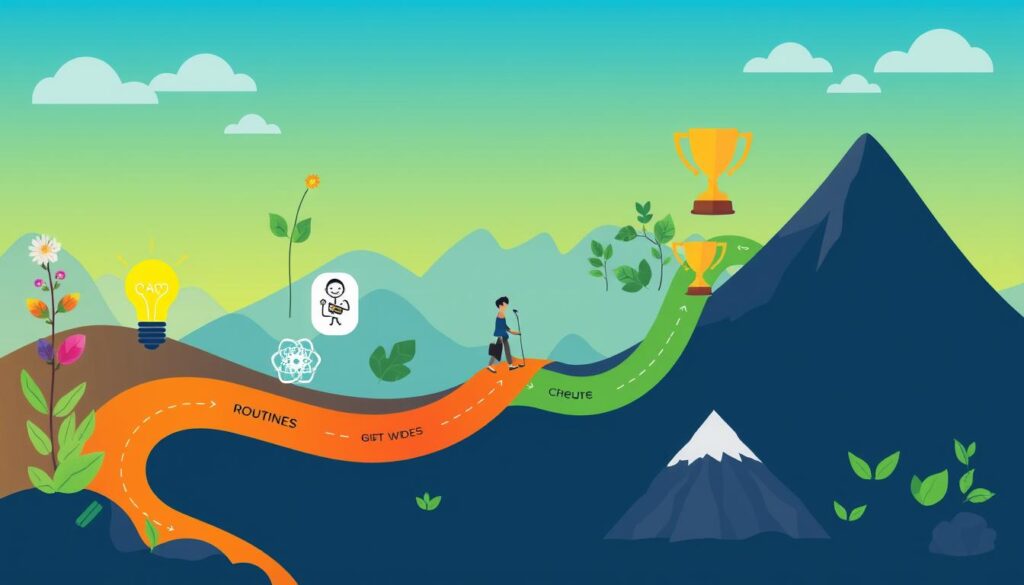Habits shape our attitudes, actions, and decisions, touching every part of our lives. Good habits help us achieve our goals, grow personally and professionally, and feel more satisfied. They are driven by the brain’s reward-seeking mechanisms, often triggered by specific cues.
Forming habits makes our brain more efficient, allowing tasks to be done without much thought. This efficiency can be good or bad, depending on the habit. Knowing how habits form is key to building positive ones and changing our daily lives.
Key Takeaways
- Habits shape our attitudes, actions, and decision-making abilities, affecting every aspect of our lives.
- Forming good habits can help us reach our goals, develop personally and professionally, and feel more fulfilled.
- Habits are driven by reward-seeking mechanisms in the brain, often triggered by specific cues.
- Understanding habit formation is key to building positive habits and transforming our daily lives.
- Habits can be both positive and negative, depending on their nature and how they are formed.
Understanding Habits: The Foundation of Change
Habits shape our daily lives, influencing our behaviors and well-being. To make positive changes, it’s key to know the difference between habits and routines. We also need to grasp the psychology behind forming habits.
Difference Between Habits and Routines
Habits are actions we do without thinking much. Routines, on the other hand, need effort and intention. Habits work on autopilot, while routines are more mindful and purposeful.
The Psychology Behind Habit Formation
The habit formation process has four stages: cue, craving, response, and reward. This “habit loop” constantly guides our actions and shapes our behaviors.
Why Habits Matter in Daily Life
Habits impact our happiness, health, and productivity. They are the base for personal and professional growth. Knowing the difference between habits and routines, and how they form, is crucial for positive change.
| Habit Formation Statistics | Key Insights |
|---|---|
| The myth that it takes 21 days to form a new habit is debunked. | The process of habit formation varies from person to person, with the average time ranging from 18 to 254 days. |
| Habits follow a loop consisting of cues, routines, and rewards. | This loop plays a crucial role in forming and changing habits, requiring understanding of current behaviors and adjusting routines and rewards. |
| Healthy habits can lower the risk of health issues like heart disease, stroke, cancer, and diabetes. | Developing positive habits, such as regular exercise, balanced diet, and sufficient sleep, can significantly improve overall well-being. |
“Habits are the compound interest of self-improvement. The more you can build good habits, the more you’ll benefit from compounding progress.” – James Clear, author of “Atomic Habits”
Understanding habits and routines, and the psychology behind them, is the first step to lasting positive change.
The Science of Habit Loops and Behavior Change

Habits shape our daily lives, influencing our actions and routines. To grasp how habits form and change, we must explore the habit loop’s science. This cycle includes four stages: cue, craving, response, and reward.
The cue is what starts the habit, like a specific time or place. It makes our brain want to act on a craving. The response is what we do, which can be a thought or action. The reward then fulfills this craving, making us more likely to repeat the behavior.
This loop is key to changing our behaviors. By learning about its neuroscience, we can build better habits and break bad ones. Research shows habits make up to 43% of our daily actions, done without thinking.
“Habits are the invisible architecture of everyday life.” – Gretchen Rubin
Changing our environment is more effective than willpower in breaking habits. Things like where we are, when, and who we’re with greatly influence our habits. By changing these, we can support lasting behavior changes.
The study of habit loops and behavior change gives us powerful tools for life improvement. Knowing the psychology and neuroscience behind habits lets us control them. This opens the door to personal growth and better well-being.
Positive Habits That Drive Personal Growth

Building positive habits is key to personal growth. They greatly affect our health, mind, and career. By adding these habits to our daily lives, we can start a journey of personal development.
Physical Well-being Habits
Keeping our body healthy is the base for well-being. Good physical habits include 30 minutes of moderate activity per day, eating well, and 7-9 hours of sleep each night. These habits boost our energy, strengthen our body, and help us think clearer and feel happier.
Mental Health-Enhancing Habits
Our mental health is just as important for growth. Good mental habits are daily meditation, journaling, and expressing gratitude. These practices lower stress, help us understand ourselves better, and make us more positive and resilient.
Professional Development Habits
Improving ourselves at work is also vital. Good work habits are learning every day, networking, and managing time well. Doing these helps us grow, connect with others, and work better, leading to success and happiness in our careers.
Adding these positive habits to our daily life can change us for the better. By focusing on our health, mind, and work, we can reach our full potential and live a more rewarding life.
| Habit Category | Examples | Benefits |
|---|---|---|
| Physical Well-being |
|
|
| Mental Health-Enhancing |
|
|
| Professional Development |
|
|
“Small, sustainable changes in our daily habits can lead to profound, life-changing transformations.” – James Clear, author of “Atomic Habits”
Breaking Down the Habit Formation Process

Building positive habits takes time, effort, and knowing how our minds work. It usually takes about 66 days to form a habit. This time can vary from 18 to 254 days, depending on the habit.
To form new habits, we need to replace old ones. This means controlling our environment, focusing on one change at a time, and sticking to it. Small, consistent steps are crucial for making new habits a part of our daily lives.
The habit formation process follows a four-step cycle: cue, craving, response, and reward. This shows how important it is to know what triggers our behaviors, what we desire, how we act on those desires, and what rewards we get. These rewards help make the behavior a habit.
Habit formation is about making lasting changes in our lives. It can improve our health, happiness, and success. By understanding this process, we can set achievable goals, find effective strategies, and overcome challenges to build new habits.
| Habit Formation Statistic | Percentage |
|---|---|
| Resolution-makers who maintained pledges for one week | 77% |
| Resolution-makers who kept their resolutions after two years | 19% |
Consistency, repetition, and commitment are key to forming habits. By understanding how habits are formed, we can make lasting, positive changes in our lives.
“Habits are the primary determinant of an individual’s life outcomes, whether related to health, happiness, or success.”
Common Obstacles in Building New Habits

Starting new habits can be tough. Many obstacles can stop us from succeeding. Knowing these common challenges is key for lasting changes.
Environmental Influences
The place we live affects our habits a lot. Social pressures, lack of support, or temptations can slow us down. It’s important to see how our surroundings shape us.
Psychological Barriers
Building habits is also a mental battle. Self-doubt, fear of failure, or resistance to change can block us. We need to face these inner struggles and grow.
Time Management Challenges
Managing time is a big hurdle. Balancing work, family, and habits can be hard. Good time management helps us make space for new habits.
Other challenges include trying too many habits at once, not being committed, or focusing too much on results. We must tackle these issues to build lasting habits.
“Successful habit formation is not about willpower or motivation; it’s about creating the right environment and systems to support your desired behaviors.”
By understanding environmental factors, psychological challenges, and time management issues, we can find ways to overcome them. This helps us make lasting, positive changes in our lives.
Strategies for Sustainable Habit Development

Creating lasting, positive habits can change your daily life for the better. To make lasting changes, it’s important to use smart strategies. These strategies help you understand and change your behavior.
One good strategy is to get rid of things that make you do bad habits. Find out what triggers bad habits and avoid them. Also, figuring out why you crave certain habits can help you find better ones.
- Make negative habits difficult to perform: Introduce friction or obstacles that make it harder to engage in unwanted behaviors, such as hiding unhealthy snacks or disabling social media apps on your devices.
- Adopt healthy routines: Establish positive habits by incorporating them into your daily routine. This could involve incorporating physical activity, mindfulness practices, or productive tasks into your schedule.
- Swap bad habits for better ones: Instead of eliminating a habit entirely, replace it with a more beneficial alternative. For example, swap mindless scrolling with reading or engaging in a creative hobby.
- Build intrinsic motivation: Cultivate a deep, personal desire to change by aligning your habits with your core values and long-term goals. This intrinsic motivation will provide the necessary drive for sustainable habit development.
Building new habits takes time and effort. Start small and gradually get harder. Set goals to track your progress and stay focused on the journey, not just the end result.
| Habit Development Strategies | Benefits |
|---|---|
| Eliminating triggers for bad habits | Disrupts the habit loop, making it easier to break unwanted behaviors |
| Reducing cravings by identifying underlying needs | Allows for the replacement of habits with more constructive alternatives |
| Making negative habits difficult to perform | Introduces friction that discourages engagement in unwanted behaviors |
| Adopting healthy routines | Establishes positive habits as part of daily life, promoting long-term change |
| Swapping bad habits for better ones | Replaces unhealthy behaviors with more beneficial alternatives |
| Building intrinsic motivation | Provides the necessary drive for sustainable habit development |
Using these strategies can help you develop good habits. It’s all about being consistent, setting goals, and focusing on the journey. This way, you can create lasting, positive habits.
Tools and Techniques for Tracking Habit Progress
![]()
Building positive habits is a journey that changes you. Tracking your progress is key to keeping up the good work. You can use digital apps or old-school methods. The right tools and techniques can really help you reach your goals.
Digital Apps and Resources
In today’s world, many apps and software help you track habits. They offer features like setting goals, seeing your progress, and getting reminders. These tools use technology to help you understand and stay on track with your habits.
Traditional Tracking Methods
Some people like the feel of traditional methods. Writing in a habit journal, marking a calendar, or using a special sheet can feel real. These methods help you stay connected to your habits and understand your progress better.
Accountability Systems
Having someone to hold you accountable is important for building habits. Friends, family, or a partner can offer support and motivation. Online groups or a coach can also help you stay focused and reach your goals.
| Habit Tracking App | Key Features | Pricing |
|---|---|---|
| Habitica | Gamification, customizable avatars, rewards | Free, with optional in-app purchases |
| Strides | Goal-setting, progress visualization, habit streaks | Free, with subscription options |
| Momentum | Minimalist design, daily focus, habit reminders | Free, with optional premium features |
| Habitify | Customizable templates, habit groups, data analysis | Free, with subscription options |
| Streaks | Habit tracking, task scheduling, progress tracking | Paid app ($4.99) |
Using digital tools, traditional methods, and accountability systems together can help you track habits well. This approach supports your growth and helps you achieve your dreams.
Also Read : Quick And Healthy Breakfast Ideas To Energize Your Morning
Conclusion
Changing your life for the better through positive habits is a powerful journey. It’s about growing and improving yourself. By learning how habits work, you can change your life in many ways.
Good habits can make you healthier, stronger in mind, and better at work. They are the key to a happy and successful life.
Building good habits takes hard work, patience, and the right tools. You need to face challenges like bad surroundings and your own doubts. But with the right mindset and strategies, you can overcome them.
Setting SMART goals and understanding the habit loop can help. This means knowing the cue, routine, and reward of your habits. It leads to lasting changes that improve your life.
In the end, building positive habits changes your life for the better. It boosts your well-being, makes you more productive, and helps you live a positive lifestyle. By changing your behavior, you can reach your full potential and live a more meaningful life.
FAQs
Q: What are some examples of good habits I can form to transform my life?
A: Examples of good habits include regular exercise, maintaining a balanced diet, practicing mindfulness, reading daily, and setting a to-do list to organize tasks. These habits can significantly impact your health and well-being.
Q: How can I break a bad habit effectively?
A: To break a bad habit, start by identifying triggers, setting clear goals, and replacing the bad habit with a positive one. Maintaining a positive attitude and using positive affirmations can also help in this process.
Q: What is the best way to establish good habits?
A: Establishing good habits involves setting specific, achievable goals, starting small, and being consistent. It can also help to track your progress and reward yourself for achievements to reinforce the new behavior.
Q: Can you provide a list of good habits to develop for a happier life?
A: Sure! A list of good habits to develop includes daily exercise, practicing gratitude, staying hydrated, getting enough sleep, and engaging in hobbies. These contribute to mental peace and overall well-being.
Q: How long does it take to form a new habit?
A: The time it takes to form a new habit can vary, but research suggests it typically takes about 21 to 66 days of consistent practice for a habit to become automatic. Consistency is key in this process.
Q: What are some financial habits that can improve my financial well-being?
A: Good financial habits include budgeting, saving a portion of your income, tracking expenses, and investing wisely. These practices can transform your financial situation and contribute to a happier life.
Q: How do good habits and bad habits affect our mental well-being?
A: Good habits can lead to improved mental peace and a happier life, while bad habits can create stress and anxiety. It’s essential to focus on developing good habits to enhance your overall mental and emotional health.
Q: What should I include in my habits list to ensure well-being and success?
A: A habits list for well-being and success should include good habits like regular exercise, healthy eating, consistent learning, positive social interactions, and mindfulness practices. These habits collectively contribute to a fulfilling life.
Q: How can I maintain a positive attitude while trying to break a bad habit?
A: To maintain a positive attitude while breaking a bad habit, focus on small victories, practice self-compassion, and surround yourself with supportive people. Positive affirmations can also reinforce your commitment to change.
Q: What are organizational habits that can help in my daily life?
A: Organizational habits that can enhance daily life include creating a daily to-do list, decluttering your workspace regularly, setting goals, and prioritizing tasks. These can lead to increased productivity and a more organized life.
Source Links
- https://www.staypositive.news/article/incorporating-positive-habits-into-our-daily-lives
- https://extraordinaryroutines.com/habit-experiment-1
- https://effectiveretailleader.com/habits-are-the-foundation-for-success/